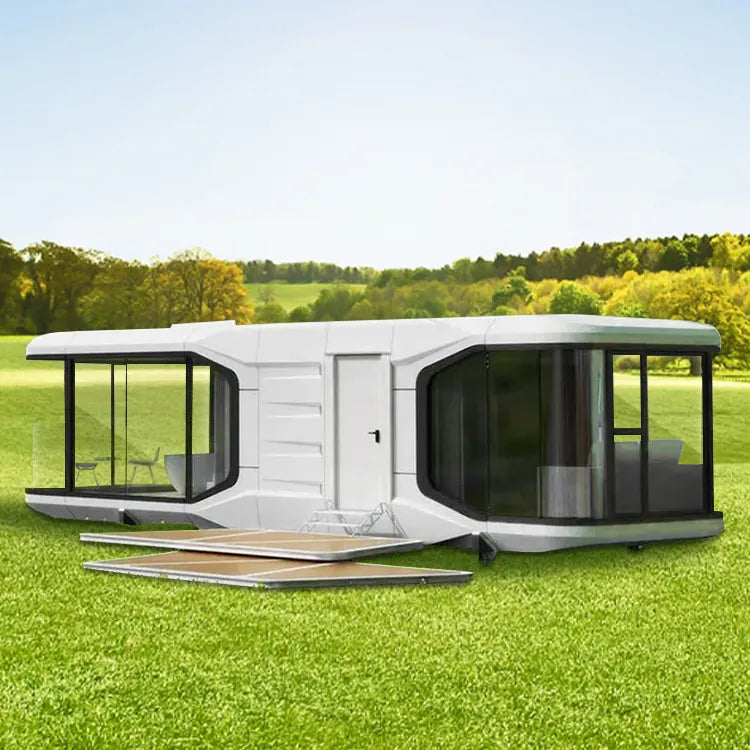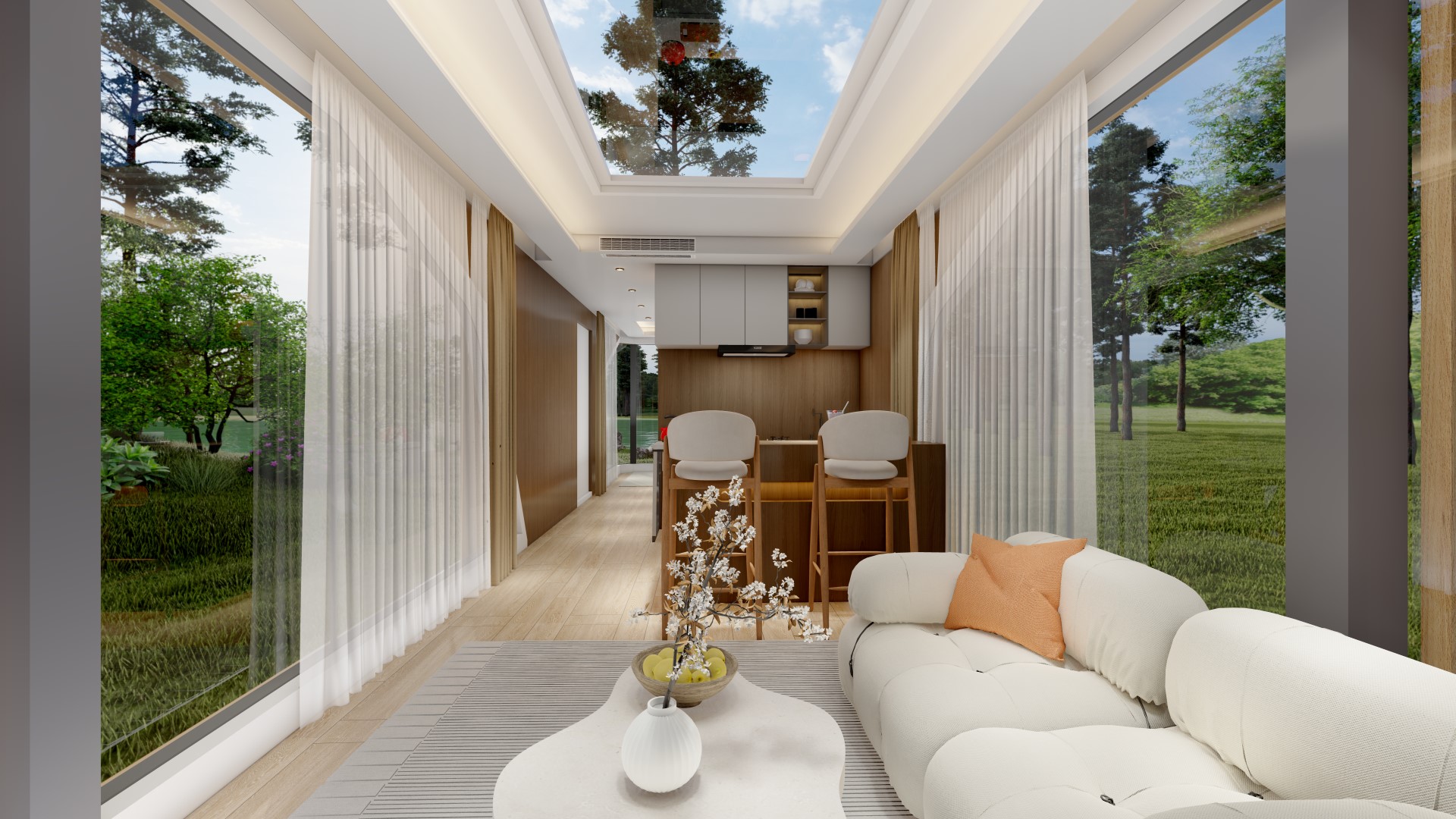The Ultimate Guide to Living in Capsule Houses: Pros and Cons
The Ultimate Guide to Living in Capsule Houses: Pros and Cons
Blog Article
Why Modular Houses Are the Future of Sustainable Living
Modular homes are significantly recognized as a crucial remedy for lasting living, offering a blend of performance, cost-effectiveness, and ecological advantages. Their building in regulated settings substantially reduces waste and boosts precision, while the potential for including sophisticated energy-efficient systems positions them as a forward-thinking alternative in housing. Furthermore, the flexibility of modular designs permits the assimilation of sustainable technologies and materials tailored to individual requirements. As we browse the challenges of urbanization and environmental sustainability, one have to consider just how these homes can redefine our method to living areas.
Environmental Benefits of Modular Houses
The environmental benefits of modular homes stand for a considerable action towards sustainable living. These homes are built in controlled factory setups, which dramatically reduces waste generated during the structure procedure. By maximizing materials and reducing excess, modular building and construction contributes to a much more reliable use sources compared to conventional building techniques.
In addition, modular homes are often made with power performance in mind. Many integrate innovative insulation strategies, energy-efficient home windows, and sustainable materials, contributing to reduced power usage. This can cause decreased greenhouse gas discharges over the lifespan of the home, improving its overall ecological account.
The capacity to transport and construct modular parts on-site also lowers the carbon impact connected with building and construction logistics. Additionally, numerous modular homes are developed to be adaptable and conveniently upgradeable, permitting property owners to execute lasting innovations, such as solar panels and energy-efficient heater, with time.
Inevitably, the environmental advantages of modular homes not just advertise lasting living yet also urge an even more responsible approach to housing advancement, lining up with global initiatives to deal with climate adjustment and maintain all-natural resources for future generations.
Cost-Effectiveness and Affordability
Structure a home usually represents one of the biggest financial investments people make in their life time, and modular homes use a compelling remedy for those looking for cost-effectiveness and cost. One of the key advantages of modular homes is their reduced building and construction expenses contrasted to traditional site-built homes. The structured production process permits significant financial savings on labor and materials, which converts to reduce prices for customers.
Additionally, modular homes usually have shorter construction timelines. This not only lowers expenses connected to financing and insurance however likewise reduces the dangers related to rising cost of living and fluctuating market problems. Lots of purchasers find that modular homes can be tailored to fit their spending plans without compromising high quality or style.
Additionally, energy performance is usually developed into the layout of modular homes, causing reduced energy bills over time. Lots of makers focus on lasting products and practices, additionally improving the long-term monetary feasibility of these homes. Overall, the mix of first price financial savings, rapid building, and ongoing energy efficiency makes modular homes an eye-catching option for those aiming to invest in sustainable living without breaking the financial institution.
Efficiency in Building And Construction
Modular homes not just supply financial benefits yet additionally succeed in building performance. The modular building process includes the synchronised construction of components in a manufacturing facility setting while website prep work happens simultaneously. This parallel method dramatically decreases the total timeline from fertilization to conclusion, usually reducing construction time by as much as half contrasted to typical approaches.
Moreover, factory-controlled environments improve top quality assurance. By utilizing precision production techniques, modular homes are built to exact requirements, decreasing waste and errors. This consistency not just causes a better product however likewise adds to sustainable methods by reducing material waste throughout building and construction.
Additionally, making use of contemporary technology and automation in the production process enables quicker assembly and decreased labor prices. Once the modules are carried to the website, they can be effectively put together, additionally accelerating the timeline. This structured process is not only advantageous for home builders yet likewise minimizes disruptions to the surrounding environment throughout construction.
Personalization and Layout Flexibility
An outstanding selection of customization choices identifies modular homes, enabling property owners to customize their space to satisfy specific requirements and preferences. This style versatility is a hallmark of modular building and construction, making it possible for clients to pick every little thing from floor plans and room designs to surfaces and fixtures. Unlike conventional homes, modular layouts help with a collaborative approach where home builders and designers function very closely with homeowners, guaranteeing that each aspect lines up with aesthetic needs and specific way of lives.
Additionally, modular homes can be quickly reconfigured or broadened, suiting changing family members dynamics or advancing individual preferences. This versatility not only enhances the home's functionality yet also adds to long-lasting sustainability, as homeowners can change their spaces as opposed to seek new housing services.

Future Fads in Sustainable Real Estate
Emerging fads in sustainable housing are improving the landscape of domestic building, emphasizing ingenious modern technologies and green practices. One substantial trend is the assimilation of smart home modern technology, which boosts energy efficiency with automated systems that optimize and monitor power usage. This not only decreases utility expenses however additionally adds to a lower carbon impact.
In addition, the use of sustainable materials is becoming significantly common. Building contractors are choosing for reused, in your area sourced, or have a peek at these guys quickly sustainable materials, which minimize environmental influence and support neighborhood economies. Modular homes are gaining popularity for their decreased waste throughout building and their versatility to numerous terrains and climates.
One more pattern is the incorporation of eco-friendly roofs additional resources and living wall surfaces, which boost air quality and provide all-natural insulation. These functions also promote biodiversity in urban locations.
Conclusion
In conclusion, modular homes arise as a pivotal remedy for sustainable living, offering substantial environmental benefits with minimized waste and power efficiency. As trends in lasting real estate evolve, modular homes are positioned to play an essential role in promoting environment-friendly living methods for future generations.
Structure a home typically represents one of the biggest monetary investments individuals make in their lifetime, and modular homes offer a compelling remedy for those looking for cost-effectiveness and cost. One of the key advantages of modular homes is their reduced construction expenses compared to traditional site-built homes. In general, the mix of initial expense financial savings, quick construction, and ongoing power performance makes modular homes an description appealing choice for those looking to spend in lasting living without damaging the financial institution.
Eventually, the modification and layout versatility used by modular homes guarantee that they are not simply structures, yet customized sanctuaries that show the special identifications of their owners while advertising sustainable living methods.

Report this page